It is well known at this point that despite all of the buzz around the iPhone X ahead of launch, the phone did not selling as well as expected. Samsung was a key partner for the iPhone X and produced many OLED displays for Apple based on expected demand. Now, it looks like Apple is about to pay Samsung a hefty sum for the unused panels.
South Korean news outlet, ET News, wrote a few days ago that Samsung was seeking compensation from Apple for the production of OLED displays that never made it to market. Now, according to a second report from Reuters, Apple is expected to foot the bill, which will amount to around 800 billion won, or around $684 million USD.
This one-off payment has been noted on Samsung's latest earnings expectations report, which will also help off-set the losses expected from the continued US-China trade war.
Unfortunately, we don't know how many iPhone X units Apple asked Samsung to supply displays for, or what the exact sales expectations were. However, we do know from previous earnings reports and supply chain leaks that sales did not go as well as expected over Q4 2017.
KitGuru Says: Apple might be the richest company on the planet but over half a billion dollars wasted on unused OLED supply probably still stings a bit. It will be interesting to see how this year's batch of iPhones do compared to the X, as the design will be very similar but will have had more time to catch on at this point.
 KitGuru KitGuru.net – Tech News | Hardware News | Hardware Reviews | IOS | Mobile | Gaming | Graphics Cards
KitGuru KitGuru.net – Tech News | Hardware News | Hardware Reviews | IOS | Mobile | Gaming | Graphics Cards



